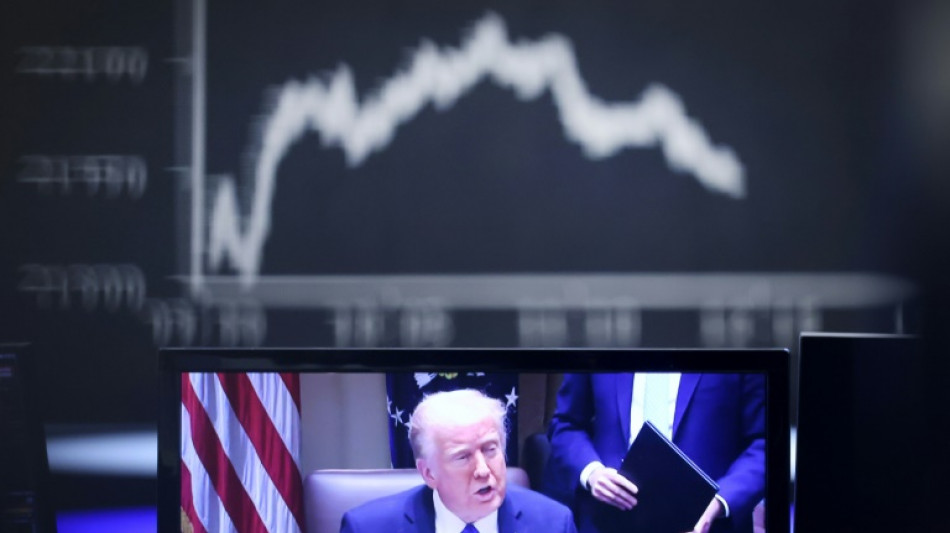
RBGPF
1.0200


Wall Street led a global markets bloodbath Thursday as countries around the world reeled from President Donald Trump's trade war, while the White House insisted the US economy would emerge victorious.
The Dow Jones dropped 3.75 percent and the S&P 500 plummeted more than four percent. The Nasdaq took the worst hit, falling more than five percent.
Shock waves also tore through markets in Asia and Europe in the wake of Trump's Wednesday announcement, while foreign leaders signaled readiness to negotiate but also threatened counter-tariffs.
Trump slapped 10 percent import duties on all nations and far higher levies on imports from dozens of specific countries -- including top trade partners China and the European Union.
The 78-year-old Republican unveiled his dramatic economic gamble as a ploy to make the United States free from reliance on foreign manufacturers in a massive economic reshaping.
And on Thursday, he likened his trade war to a painful medical procedure -- due to bring success.
"THE OPERATION IS OVER! THE PATIENT LIVED," he posted on his Truth Social app, with his trademark use of all-caps.
"THE PATIENT WILL BE FAR STRONGER, BIGGER, BETTER, AND MORE RESILIENT THAN EVER BEFORE."
China demanded that the tariffs be "immediately cancelled" and vowed "countermeasures," while France and Germany warned that the EU could hit back at US tech firms.
French President Emmanuel Macron called for suspending investment in the United States until what he called the "brutal" new tariffs had been "clarified."
But the 27-nation EU and other countries also showed willingness to negotiate as they refrained from immediate retaliatory measures, with almost a week until the harsher US levies actually take effect.
Beijing said it was "maintaining communication" with Washington over trade issues, and EU trade chief Maros Sefcovic planned to speak with US counterparts on Friday.
In Latin America, Brazil's president vowed to take "all appropriate measures," while Mexican President Claudia Sheinbaum expressed relief at being left off the new round of tariffs -- even if the major US trading partner is already on the hook for 25 percent tariffs on some products.
Gold prices hit a new record high, oil fell and the dollar slumped against other major currencies.
"The last 24 hours have seen an historic transformation to the global trading system," said Deutsche Bank analyst Jim Reid.
- What's Trump's plan? -
Trump's tariff onslaught is hugely risky, facing multiple warnings about triggering a global economic slowdown and politically damaging price rises at home.
There is also uncertainty over whether the goal is only to pressure other countries into negotiating or to go the whole way and, as Trump vowed in his Wednesday speech, make the United States the all-dominant trading and manufacturing power.
White House spokeswoman Karoline Leavitt told CNN that Trump "made it clear yesterday (Wednesday) this is not a negotiation."
However, the US business community is likely to push for resolving the trade conflicts.
Trump's former treasury secretary Steve Mnuchin told CNBC that he was "hopeful" the bigger tariffs would be negotiated down.
And Trump's son Eric Trump posted on social media that "the first to negotiate will win -- the last will absolutely lose."
- 'Treat us badly' -
Trump reserved some of the heaviest blows for what he called "nations that treat us badly."
That included an additional 34 percent on goods from China -- bringing the new added tariff rate there to 54 percent.
The figure for the European Union was 20 percent, and 24 percent on Japan.
For the rest, Trump said he would impose a "baseline" tariff of 10 percent, including on another key ally, Britain, which will come into effect on Saturday while the higher duties will kick in on April 9.
The White House said Russia was spared because it is already under sanctions over its war in Ukraine which "preclude any meaningful trade."
Separate tariffs of 25 percent on all foreign-made cars also went into effect.
That had an immediate impact on the ground, with US-European automaker Stellantis -- owner of Jeep, Chrysler and Fiat -- to pause production at some Canadian and Mexican assembly plants.
burs-sms/bgs
V.Fan--ThChM